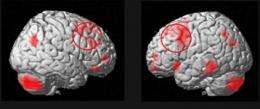Shedding light on memory deficits in schizophrenic patients and healthy aged subjects

Working memory, which consists in the short-term retention and processing of information, depends on specific regions of the brain working correctly. This faculty tends to deteriorate in patients with schizophrenia, as it does in healthy aged subjects.
Jean-Claude Dreher, senior researcher at the Centre de Neurosciences Cognitives, in collaboration with an American team from the National Institute of Mental Health (Bethesda, Maryland), has shown for the first time that working memory deficits in schizophrenics and elderly subjects are accompanied by differences in prefrontal cortex activation, even though the working memory deficits are identical. These results, which shed new light on the brain mechanisms underlying working memory disorders in schizophrenics and elderly subjects, are published online on the 17 February 2012 in the US journal Biological Psychiatry.
What are the brain mechanisms involved in working memory deficits in schizophrenics? How can these cerebral changes be compared to those observed during healthy ageing, which can also lead to similar working memory disorders?
To answer these questions, the research team used medical imaging(1) to compare the cerebral activation of two groups, healthy elderly subjects and medication-free schizophrenic patients.
Previous studies have shown that schizophrenics suffer from working memory deficits accompanied by a malfunction of the dorsolateral prefrontal cortex. In this new study, each schizophrenic patient was paired with a healthy aged subject with virtually identical memory performance. Using this original approach, it is possible to determine whether similar working memory performance impairment in schizophrenic patients is the result or the cause of the prefrontal cortex malfunction. Until now, doubts remained. Indeed, schizophrenic patients were compared with young, healthy “control” subjects whose working memory performance was better than that of the affected group. Consequently, performance differences between the two groups (schizophrenics and young subjects) could not demonstrate the link between the illness and the prefrontal cortex malfunction.
This new study shows that schizophrenic patients show reduced prefrontal cortex activation, whereas healthy aged subjects over-activate this region while performing working memory tasks (see figure). This finding enables the research team to conclude that reduced activation of the prefrontal cortex in schizophrenics is part of the neurophysiopathology of the illness. The cognitive impairment of patients with schizophrenia is thus the result of a prefrontal cortex malfunction.
The neuronal mechanisms underlying the working memory deficits characterizing the two groups of subjects are thus different. In healthy elderly subjects, the study shows that working memory deficits are not necessarily accompanied by a reduction in prefrontal cortex activation, as observed in schizophrenic patients. In the long run, the efficacy of pharmacological agents in treating cognitive deficits in schizophrenic patients and aged subjects could be improved by targeting more specific regions of the brain.
More information: J-C Dreher, P., et al.. Common and differential pathophysiological features accompany comparable cognitive impairments in medication-free patients with schizophrenia and in healthy aging subjects, Biological Psychiatry, 17 Feb 2012

















